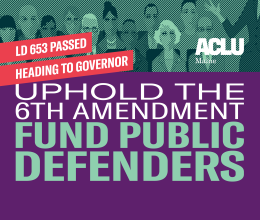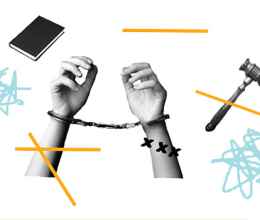Each Friday, we’ll bring you updates on the latest civil liberties news from Maine and the nation.
ACLU Releases Briefing Paper of Women in Solitary Confinement
On Thursday, the ACLU launched a briefing paper, Worse than Second-Class: Solitary Confinement of Women in the United States, that documents the repercussions of subjecting women prisoners to solitary confinement and the reforms needed to address them.
Solitary confinement is often used against the most vulnerable members of our society: pregnant women, individuals with mental illness, transgender women, and victims who report sexual assault by prison guards.
As you may have read in Grainne’s blog on Solitary earlier this week, PBS Frontline has just aired a film titled “Solitary Nation”. Reforming the solitary policy in Maine and the United States is a work in progress, one that requires constant attention and scrutiny.
FCC Plans to Change Internet Regulations
The Federal Communications Commission (FCC) announced Wednesday that it plans to propose new rules that allow companies to pay Internet service providers like Comcast and Verizon for “faster lanes” to send video and other content to their customers.
What does this mean?
Currently, the Internet operates under the principle of Net Neutrality – which ensures that the Internet is transparent, open, and free-flowing. Net Neutrality means that Internet service providers cannot discriminate based on content and applications online. It guarantees a level playing field for all Web sites and Internet technologies.
Net Neutrality is a concept that predates the Internet. In 1860, a U.S. federal law was passed to subsidize a telegraph line stated that “messages received from any individual, company, or corporation, or from any telegraph lines connecting with this line at either of its termini, shall be impartially transmitted in the order of their reception, excepting that the dispatches of the government shall have priority.” The Internet has operated according to this neutrality principle since its earliest days.
The ACLU believes that the FCC’s plans to eliminate Net Neutrality through allowing Internet service providers to impose a new price of entry for innovation on the Internet would be detrimental to our freedom of speech. Freedom of expression is meaningless if the forums where people actually make use of it are not themselves free.
American Civil Liberties Union policy advisor Gabe Rothman reacted to the FCC’s plans to enshrine “pay-for-play”: "If the FCC embraces this reported reversal in its stance toward net neutrality, barriers to innovation will rise, the marketplace of ideas on the internet will be constrained, and consumers will ultimately pay the price."
Read the ACLU Q&A on Net Neutrality here.
Michigan Ban on Affirmative Action Upheld
In a divided vote, the Supreme Court decided on Tuesday that voters in individual states have the right to end affirmative action. The 6-2 ruling upheld a Michigan constitutional amendment that bans affirmative action in the state’s public universities admissions.
Justice Sonia Sotomayor, in the longest and most significant dissent of her career, said the Constitution required particular vigilance in light of our country’s history of slavery, Jim Crow and discriminatory changes to state voting laws. “We ought not wish away, rather than confront, the racial inequality that exists in our society. ... The way to stop discrimination on the basis of race is to speak openly and candidly on the subject of race,” Sotomayor stated.
In an interview with NPR’s Michel Martin, Steve Shapiro, national legal director for the American Civil Liberties Union, commented on the Supreme Court’s decision:
“I think the consequence of yesterday's decision is going to be sadly predictable. We're going to see what - a repeat of what happened between 2006 and 2012 when this ban was in place. And that is a substantial decline in the number of minority students at Michigan's public universities … One thing that is not an adequate proxy and that many people have proposed is simply substituting class for race. We ought to have more class diversity in our higher education system as well, but it's not the same as race.”
Read more here.







